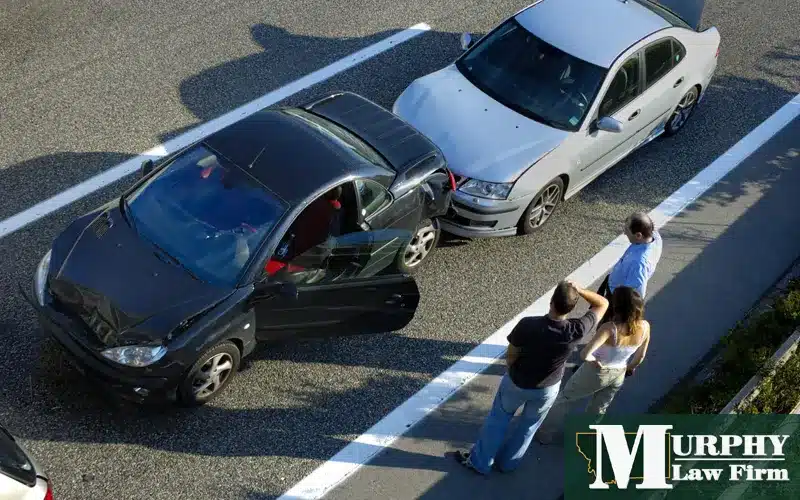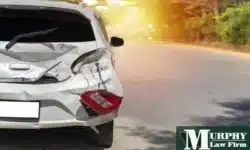
Learn what to do to protect your rights and get maximum compensation after a break-check accident
Aggressive driving is one of the most preventable causes of car accidents. Road rage is often a factor in these types of cases, and the consequences of someone acting upon their anger can be devastating.
In fact, operating a vehicle in a careless manner was cited as the primary cause of death in 7.3% of car crashes in 2020, with brake checking being responsible for many fatal car accidents each year.
Due to the nature of brake checking, it’s sometimes hard to prove the other party’s liability in an accident. Knowing what to do when you’re involved in a brake-checking accident can make it easier to navigate your way through your personal injury claim.
What is brake checking?
Brake checking occurs when someone unexpectedly and deliberately slams on their brakes while driving in an effort to frighten or intimidate the driver behind them. This reckless behavior can cause you to swerve into oncoming traffic or rear-end them. Slamming on your brakes could also cause you to get hit by the person behind you.
Why do drivers brake check?
Usually a driver brake checks out of a desire to take their anger out on the person behind them. Some common reasons drivers brake check include:
- They think the person behind them is following too closely.
- They’re trying to get back at another driver who they believe cut them off.
- They’re intentionally trying to cause an accident to defraud an insurance company.
Is brake checking illegal?
Brake checking is considered a form of reckless driving, which makes it illegal. Anytime a person intentionally does something that they know increases the risk of an accident, they’re breaking the law. If a law enforcement officer witnesses this behavior, the driver could be charged with a crime, especially if it leads to an accident.
What are common injuries that result from brake checking?
There are several types of injuries that commonly result from brake checking, and you’ll want to be aware of the potential for developing these health issues after an accident:
- Broken bones
- Soft tissue injuries
- Lacerations
Related Read: Proving Negligence in a Wrongful Death Lawsuit
How is fault proven in a brake-checking incident?
You’ll need to prove that the other party failed to honor their duty of care while driving on the road. Part of proving this will involve demonstrating that the other party suddenly and intentionally hit their brakes without warning and that this action caused you to develop injuries from the accident.
Witness statements, police reports, video footage, medical records and traffic citations are all types of evidence that could help you prove the other party’s fault for your injuries.
How To Prove Fault in a Montana Car Accident
Learn how to prove negligence after a car accident in Great Falls so you can recover the compensation you deserve and protect your rights.
How does Montana’s modified comparative fault theory work?
The modified comparative fault theory is based on the concept that you could still receive compensation for your injuries if you played a small role in causing the accident.
An example of this would be if you were considered partially responsible for the accident because you were following too closely behind the brake checker to have enough room for a safe stop. As long as your percentage of fault does not exceed 50%, then you could still receive compensation for your injuries. Your final compensation would just be reduced by your percentage of fault, as determined by a judge.
What types of compensation can I recover from a brake-checking accident?
There are 3 main types of compensation that you could recover from a brake-checking accident. Rear-end accidents often lead to a need for extensive medical treatment, rehabilitation and therapy, so you may be entitled to the following:
- Economic damages. These include costs like healthcare bills, property damage and lost wages if you’re unable to work.
- Non-economic damages. These are damages that aren’t based on financial losses and may include things such as pain and suffering, emotional distress, loss of enjoyment of life, and other intangible harms.
- Punitive damages. These damages are typically only awarded when there is clear evidence of malice or an intent to commit fraud.
How long do I have to file a personal injury case in Montana after a car accident?
The statute of limitations is 3 years for personal injury claims in Montana. While this seems like a long time, it can go by in the blink of an eye when you’re dealing with serious pain, discomfort and property damage.
You also have a better chance of a successful outcome for your case when you begin the process of filing your claim early. Taking action right away helps to ensure that the evidence is preserved and any witnesses have the experience fresh in their minds.
What steps should I take after a brake-check car accident?
Emotions tend to run high after a brake-checking car accident. Focusing on providing everyone who needs it with immediate medical care can help prevent you from saying or doing anything that could be used against you later.
Once everyone’s health needs are taken care of, here’s what to do after a car crash to protect your rights:
- Call the police and file a report.
- Don’t admit fault or apologize to the other driver.
- Exchange information with the other driver.
- Document what happened through photos, videos and witness statements.
- Get medical treatment right away so your injuries are documented.
- Notify your insurance company of the accident.
- Contact an attorney who can help you complete each essential step of filing your claim and protect your rights.
Contact a Montana personal injury attorney
Personal injury attorneys are experienced in handling complicated car accidents that occur from aggressive driving. With brake-checking accidents, it’s common for the offending driver to try to assign blame to the other party. A car accident attorney can help gather evidence to prove fault in your case and get you maximum compensation for your claim.
At Murphy Law Firm, our dedicated car accident attorneys have more than 75 years of combined experience helping injured Montana drivers get the compensation they deserve.
Contact us today for a free consultation of your case.




